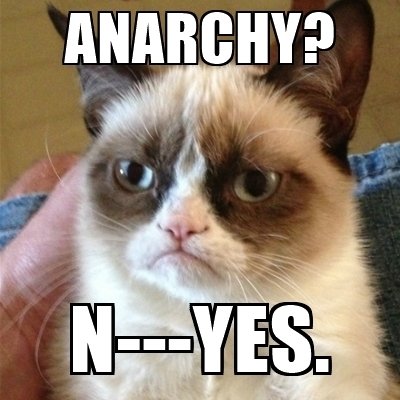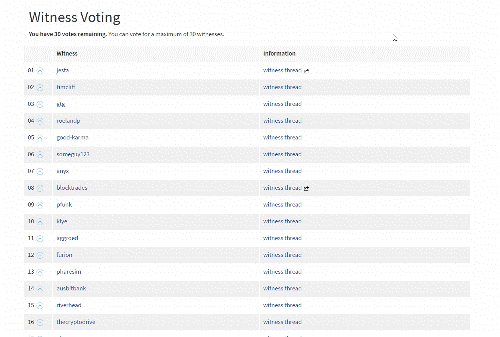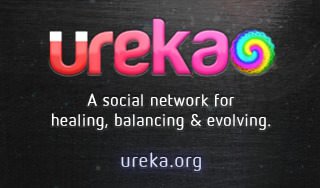Anarcho-Capitalism - Contradiction in Terms? Oxymoron? Or Not? Does Anarchy Truly Mean 'No Overpowering'?
Steemit was built on anarcho-capitalist ideals - which essentially combines the idea that we can freely own and trade 'things' without having anyone 'ruling'. But is that actually possible?

Anarchy?
The word 'Anarchy' means 'No Rulers', so the basic idea is that while each individual can create rules which they themselves live by, if those rules or the actions of the individual result in the control (ruling over) of someone else, then the principle of anarchy is not being upheld/lived. As soon as we make a rule that in some way results in a loss of liberty for someone else - by definition, we are not being anarchic.
ALL rules?
In the case of rules against 'murder' for example, if there are people who don't agree to prohibit it then it could be argued that having rules against murder prevents anarchy. This though is denying something important, which is that 'ruling' does not just mean that there is a mentally defined and possibly written down set of rules, it actually more accurately means 'overpowering' - therefore, in it's purest form, 'anarchy' means 'No Overpowering'. By murdering someone you overpower them and you also become a de facto 'ruler' who sets the decree that they will die - so therefore, there is no need for us to agree to live by a rule that murder is prohibited in order to live anarchically since murder is inherently against the anarchic principle.
This basic fact is something that is repeatedly being overlooked by many who claim to be advocating for anarchism.
Capitalism
There are several definitions of what the word 'capitalism' means since there are many agendas on Earth that like to use their power position to 'adapt' words for their own purposes. I prefer the simple definition that capitalism means: "The voluntary action of freely trading and owning 'things'".
In practise this means that there must also be the right to own things too.
Anarcho-Capitalism?
My understanding of anarcho-capitalism is that it is the combination of the two previous terms such that capitalism is allowed and there are no rulers attempting to decide who can do what. That all sounds great, but I am a stickler for details and that is partially because I have lived at the hard edge of life at times and have seen how failure to examine the minute details can result in catastrophe and unnecessary suffering.
My main question about anarcho-capitalism is quite simple - supporters of it often claim that it is a voluntary process and thus it is peaceful, however, are they not omitting to notice that 'voluntary' means not just voluntary from their perspective, but also from everyone else involved too?
For example, if we set aside for a moment the issue of how 'ownership' of land came about historically and just focus on the present moment and 'systems' - let's say there is an area of land that is unpopulated and which has sat dormant for a few years. In Great Britain it is possible for someone to claim it for themselves under certain circumstances - but what if some people come along who are anarchists and who don't voluntary agree to ownership at all? What if they come and live on the land that is unowned? How can you come along and then claim to own the land in a voluntary way if the people who are there already do not voluntarily agree to that?
If we extrapolate that out into the fuller picture - most of the land is currently 'legally' owned by a very small number of people who generally have gotten control of it as a result of war, theft and various other forms of heartlessness. In the present day they have dressed the situation up with gold, crowns, ceremonies and corporate logos - but the origins are a matter of historical fact. None of the people alive today voluntarily agreed to this situation and yet even if anarcho-capitalists had their full way and all 'rulers' were stopped from ruling today - these people would still lay claim to most of the land and would become 'rulers' by default due to them having access to most of the resources. Is it not possible to rule simply by laying claim to what others need? If you can control all the best water sources, you do not need a government and an official 'ruler' position, since you rule everyone anyway based on what you agree to allow with 'your' water.
I find it very difficult (impossible) to see how capitalism can ever be FULLY voluntary - even if we reset EVERYTHING and cancelled all land ownership and said that everyone can start again from today, it would still be highly unlikely that everyone would voluntarily agree to allow everyone to own every bit of land that they wanted to.
Real Anarchy?
What I feel is occurring here is that rather than bond emotionally with each other and evolve together as a large family, we have inherited lazy thinking that claims that humans will always fight over things and so we must have a structure to stop that fighting and it must include a degree of ruling or actual capacity for violence. Anarcho-capitalists often claim that 'the state' is what is wrong with capitalism and if we end the state then capitalism will be just fine for everyone - but often try to avoid dealing with criticism of pure capitalism without state control. I have seen they are also often quick to point the finger (deflection) at their arch-enemies 'anarcho-communists' whenever challenged on weaknesses with capitalism itself (minus the state) by saying "oh, no it's not us that wants to steal everything from everyone else - that's the anarcho-communists" without honestly contemplating how anarcho-capitalism can be said to be doing exactly the same thing but in a different way.
If there is only one capitalist on earth and he/she says 'oh, capitalism is voluntary' and no-one else wants to own any land because they don't like the idea of ownership and prefer sharing (without rulers) then that singular capitalist can lay claim to own everything without anyone challenging them. In short, I sometimes see capitalism to be like communism but with a competitive angle thrown in rather than just outright domination and control. One says "We will take everything and it will be great for everyone" and the other says "Everyone who wants to take everything can compete to do so and it will be great for everyone" - with neither allowing for the possibility that there are other people and other ways that would not voluntarily agree to either system and which would be overpowered by their enactment upon the Earth!
Did I Miss Something?
I have found in the past that even daring to criticise capitalism meets with a knee jerk reaction from some people who accuse me (absurdly) of being a communist. Identifying possible flaws in something and asking questions about it does not mean you are a supporter of it's potential opposite.
With that in mind - I am excited to learn from all you users of anarcho-capitalist technology exactly what it is I might be missing here - Over to you!
Wishing you well,
Ura Soul


View My Witness Application Here

You've been accused of being a communist? Nonsense! To each his own. Happy Saturday to you :)
Indeed, it was an amusing waste of time discussing that topic with him.. lol. Happy Caturday to you too :)
This is indeed a very interesting topic and I know that I have not found one branch of anarchist thinking that can define my own opinion of best practice.
I define anarchy as no artificial hierarchies, no immoral use of power over. Be it, the legal state coercive kind, brute force, intellectual trickery, or a first come first served mentality. Land and resource organisation is going to be one of the defining factors in the evolution of anacho-society.
Personal I think we need watershed based fractal communal federations to make agreements on primary resource uses, with consensus from everyone directly influenced by said uses.
How can one stop the 'owner' of the upper river from polluting those below?
'Air, water, food, shelter, comfort and pain,
Creative tribes based on trust and mutual gain.'
I think we agree on the basic meaning of anarchy here.
The issue of sharing the hard/good times is an important one and that's where 'compassionate anarchy' comes in - for me anarchy is not real unless it is sustainable and the only form of sustainable anarchy is compassionate anarchy!
Precisely! We will get nowhere without empathy.
I don't believe in anarcho-capitalism. I doesn't make sense. Anarcho-syndicalism was the original idea put out by Noam Chomsky.
I see, that is not an idea I have explored.. I just look at the wikipedia page for it and I see:
This is something that is an error. Power itself is 'the ability to act' and without it we die. The problem is 'power over' and not 'power'.
How does the anarcho-syndicalist idea guarantee the respect and freedom of those who do not wish to participate in it?
It is their right to live outside the walls. There would be no "power over" those who opt out of community cooperation.
Read more. It's brilliant. it's the only system fit for a decentralized platform like steemit.
What don't you believe makes sense about Anarcho-Capitalism?
The capitalism part.
Anarchy means no rulers, and to rule another person is to claim ownership (the exclusive right of control) over that person. So anarchy demands individual self-ownership, as the alternative is that people be ruled by others. The self is the most basic resource available to all of us, and self-ownership is the most basic aspect of capitalism.
Use of all scarce resources is exclusive, so whoever uses a scarce resource exclusively controls that resource for at least as long as it is in use. Capitalism is the recognition of the reality that resource use is exclusive and thus managing conflict requires consensus on resource ownership.
The concept of collective ownership is unhelpful for conflict resolution, because conflict occurs between individuals over control of scarce resources. Leaders who advocate collective ownership typically do so with the assumption that they will serve as the people's representative and thereby as the true owner of the resources in question.
From my position, I consider self ownership to be futile - I do not need to be owned at all, I simply am! :)
Capitalism implies the owning of 'things' and their use/exploitation and it is the conversion of life into mere 'resources' that is at the core of much of the heartlessness and suffering that plagues the Earth.
You don't simply exist though: you act. To act is to use means in pursuit of results. All action has opportunity cost and occurs in a context of scarcity. The very fact that you choose to participate in this discussion is an assertion of your right to use your scarce time as you desire. That's self ownership, and all action relies on scarce resources.
I think perhaps you're coming at this from an exclusively values/moral perspective rather than a rights/ethics perspective. I consider both essential (for the foreseeable future at least), but capitalism is a definition of rights, not of morals, so if you look to answer the question of what results people ought to pursue rather than what means should be used in that pursuit you will find it lacking.
If everyone agreed on what results should be pursued and by what means, ownership of resources would be harmlessly irrelevant. Since no such consensus exists at that level, consensus on property rights are essential as the next possible alternative to violence. Respecting individual property rights (capitalism) is agreement to peacefully tolerate disagreement regarding desired results and the means for achieving them.
Thanks for your intelligent commentary here. These are complex issues that need lenghty text to do justice to and I have made numerous full posts addressing aspects one by one over time. In my own thinking I tend to define that I focus on ethics and not morals since while everything from both categories ultimately stems from the individual, I view things holistically which inevitably includes all 'outer' interactions of individuals, including family and society levels.
Definitions are of the utmost importance and one seemingly small definitions change in one area can have huge implications in other areas. By defining that even I do not own myself, I am more aligned into a unity of self which does not require me to fragment into pieces. An example of this is 'control' since while many think that 'self control' is a good thing (or even possible), the understanding that 'I AM MY SELF' means that it is actually impossible for me to control my self without fragmenting into 2 artificial parts - the controller and the controlled. The actual reality for many people now is that they truly are fragmented into multiple parts, yet this is dysfunctional and I choose internal unity instead due to my awareness of the need to do so to be balanced.
Using my energy and focus (over time) as I desire does not require a concept of 'self ownership' at all, it is simply 'self acting as desired and willed'. The will need not have much of a concept of any kind of control or ownership and can succeed in all things with balanced when allowed to move freely in a way that feels what is necessary for balance to be fully manifested. If others can try to own me and my time, I do not need to try to defend my energy against that by countering it by owning myself, I only need to be fully free.
I'm not 100% sure I understood the meaning of the word 'it' in your words here. The only results that must be pursued (as a bare minimum) are the ones that are required for life to continue and to ensure that no-one is harmed. Self realisation includes within it the understanding that self ownership is not required to deliver everything needed within balance and harmony - but the difference in perspective might be subtle for some at first.
Your last paragraph is a well defined explanation for the justification for property rights and from many perspectives it is accurate, however, there is a core issue that needs to be addressed now: Namely, that the system of 'rights' and their enforcement simply changes the form of the potential violence from being one of individually empowered violence into a monopoly on violence by some kind of organisation - whether that be monarchy, state or some other form of it. In that sense, this system, while seeming just on the surface does not inherently fix very much and only provides a structure to what otherwise would be more freeing. In both cases, what is needed for harmony is enlightenment and compassion - so in both cases, without the necessary enlightenment there will be suffering/imbalance. It is my understanding that ultimately, the enlightened compassion leads to an absence of any requirement for any kind of 'authority structures' to enforce rights since 'rights are only what is right' and if we all know what is right through increased internal awareness and FELT connection to each other - then the complex mental rules based approach can be left behind and instead we can have a real and felt balance for the first time in a very, very long time.
This is why I have focused on emotional/spiritual healing for 15 years as I know from direct experience that it actually is solving our problems at the root level rather than attempting to pre-empt problems using rules and thinking only. Such attempts sometimes succeed on some level but rarely create a lasting peace that feels good to all involved.
Fascinating. I’m gonna digest and read more comments before I can comment. 😄
Anarcho-capitalism ruled by the people as a committee is the answer to the checks of unchecked capitalism. Rotating committees made up of the people. Compare this with a state rule, which has become an absolute nightmare of corruption.
I don't believe the enemy of Anarcho-capitalism are the Anarcho-communists. Both seek to govern humanity unilaterally through grassroots cooperation, just go about it in different ways. In my opinion, either would be better than the global systems that have been in the hands of a small group of people raping the people and the planet.
How is that any different to capitalist 'democracy'? Who manages the process of controlling the rotation etc.?
Having been a member of a few anarchist groups online, I can say that over 50% of the posts are between these groups scrapping with each other and accusing each other of more or less exactly the same thing.
#The key difference is that it is the people holding power vs a central state. The time of holding any position would be both optional and set in duration.
#per your second response. 1)Divide and conquer at play by state actors and 2) Ideological differences that could be amicably resolved. No doubt the difference in opinion exists but one thing is clear, at least to me and that is both these groups though they disagree on the economical point, strongly agree that a single central state will always inflict violence on its people and others to protect its existence
Isn't 'the state' just a bunch of people claiming to represent 'the people'?
Does the time period involved in some way effect the likelihood of such a structure being corrupted?
There may well be some of that going on, yes. However, there is a fundamental disagreement between the groups - although that might be due to them not understanding each other to some extent.
I have not seen any possibility of amicable resolution to the differences, they appear to be polar opposites. It's probably the case that most of the disagreements are due to the fact that the various 'state communist parties' are completely different to the core idea of what communism is. That said, I think that the originators of communism actually did intend it to become what it turned into and were essentially 'bad actors' funded by Wall St. Bankers (Warburgs).
"claim" being the keyword here.
Yes, exactly. A life long position held by one is corruptible, but held by many and divided up is much less so.
Yes, the disagreement exists but these two ideas are much closer aligned than the current pure capitalism, and the twisted, totalatarian states that fly the communist flag, systems.
I agree up until a point. The original Bolsheviks were for the ruling of society by the people, and not a few. That movement was co-opted to what it has begun today.
Yes, I am pointing to how any group can claim to be representing the best interests of the people, but they rarely do - regardless of anything whatsoever. I don't really see how direct democracy can involve any form of 'committee' since committees inherently create a form of hierarchy.
I would be interested to see the logic of how this might not be the case.
Life long positions are inherently inviting corruption, yes - however, my point is that the current systems typically involve a 3/4 year position that cycles to different people - but that doesn't in any way result in reduced corruption.. it just means that the people involved shape their groups to give the appearance of change taking place over time when it isn't.
I suspect that Lenin and Marx were both bad actors (trojan horses) sent in to create a new form of dictatorship that 'the people' would buy in to.
2.35% @pushup from @ura-soul